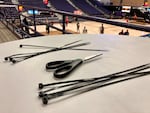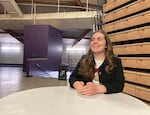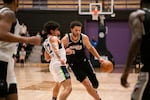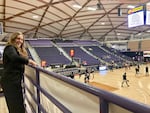
“I definitely get my steps in,” Claire Hogenson, the business operations specialist for the Rip City Remix, said about her work on game days. Hogenson, 22, is the team’s first intern turned full-time employee.
Kyra Buckley / OPB
It’s 90 minutes to game time and Claire Hogenson needs zip ties.
On the basketball court below her, it’s the minor-league version of the Portland Trail Blazers vs. the Los Angeles Lakers: the Rip City Remix are getting ready to take on the South Bay Lakers.
“Do you know where the zip ties went?” Hogenson, the 22-year-old business operations specialist for the team, asks an intern.
He does not, but sets off to find them. Minutes later, Hogenson is zip-tying up a Rip City Remix branded sign. As game time approaches, she continues flitting around the arena on the University of Portland campus, fixing signs, running up and down stairs to check in with vendors, and making sure activities in the kids’ zone are all in the right spot.

Claire Hogenson has a big job with small details, like making sure there are plenty of zip ties to hang signs. Hogenson is the business operations specialist for Portland’s first NBA G League team, the Rip City Remix.
Kyra Buckley / OPB
Hogenson is the first intern-turned-full-time-employee for the Rip City Remix. And this is the first season the Portland Trail Blazers have hosted a team connected to the NBA’s minor league system, called the G League. In addition to opportunities for budding sports stars, development leagues act as a training ground for people like Hogenson who want to break into the competitive fields of sports marketing and finance.
“There is a lot of focus on the basketball side in developing the players,” Hannah Grauert, Rip City Remix president, said. “We literally view it the same on the business side. We are a talent and development pipeline for future stars to work in the front office at NBA or other teams.”
G League teams aren’t always in the same city — or even state — as their NBA counterparts. But the 15 staff members and paid interns for the Rip City Remix share office space with the Trail Blazers staff at the Moda Center, where the Blazers play. The Remix host games at the Chiles Center on the University of Portland campus.
Hogenson was among the inaugural class of interns for the Remix. More than 200 applicants vied for the eight paid internships.

Claire Hogenson watches the game against the Iowa Wolves in Portland, Ore., on Feb. 13, 2024.
Kyra Buckley / OPB
The sports business industry is highly competitive. National data shows there are just over 130,000 jobs in the spectator sports industry. Of those, around 6% are in marketing and business operations.
Hogenson always wanted to work in sports. Her desire was further solidified when she started volunteering with Sport Oregon, a nonprofit promoting sports tourism in the state.
During her senior year at Portland’s Lincoln High School, Hogenson’s volunteer position took her to sporting events all around town. That included part of the NCAA women’s basketball tournament at the Moda Center in 2019, the year the University of Oregon went to the Final Four.
Related: The Portland Trail Blazers will start a G League team
The following fall, Hogenson herself became an Oregon Duck. She majored in sports marketing at UO’s Warsaw Sports Business Center.
“I actually only applied to the U of O,” Hogenson said. “I knew this was the place for me. I was lucky it happened to be in my backyard.”
While at UO, Hogenson worked as research team lead for a student-run program called Oregon Accelerator. She helped college athletes navigate the new world of getting paid for use of their name, image or likeness in marketing and social media — something students weren’t allowed to do before 2021.

Rip City Remix face the Iowa Wolves in Portland, Ore., on Feb. 13, 2024.
Suhela Hassan / Rip City Remix
“That idea of being part of something really innovative is something that I love,” Hogenson said. “And that I’m able to apply for this role now with being part of the G League, and having that same innovative component to it is the reason why I just love the job that I’m doing right now.”
Hogenson is also keeping her skills, talent — and income — in her home state of Oregon. Labor economists have raised concerns that more people are leaving the state than moving here, reversing a trend that helped fuel economic growth in Oregon. Well-paying attractive professional positions could woo them back, or in Hogenson’s case, entice them to stay.
Related: Blazers’ G League team will provide ‘high-quality basketball’ at an affordable price
In her role with the Remix, she does a little bit of everything, from planning theme nights, to getting graphics to the right place, to brainstorming ideas that need a testing ground before a team like the Blazers use them in front of a bigger crowd.
The G League also offers affordable options for local businesses to sponsor or partner with a team, Hogenson said. For one theme night she helped organize the “Remix Market” where local vendors set up booths selling a variety of goods from thrifted clothes and sports memorabilia to art, food, and planters made from basketballs.

Claire Hogenson straightens a sign ahead of a Rip City Remix game in Portland, Ore., on Feb. 13. Hogenson is the first intern turned employee for the city’s inaugural minor league men’s basketball team, the Rip City Remix. The team plays at the University of Portland sports arena.
Kyra Buckley / OPB
“With it being our very first season, we didn’t know what games would look like for us until we started,” Hogenson said. “That’s been really fun — to grow and have each game add a different element.”
By the time the starting lineup is being announced, the bulk of Hogenson’s game day work is done. For the game against the South Bay Lakers, Hogenson takes a seat during the first quarter to cheer on the Remix. At halftime, she walks the arena, re-taping signs, and talking to her fellow Remix staffers about what they want to try at the next game.
